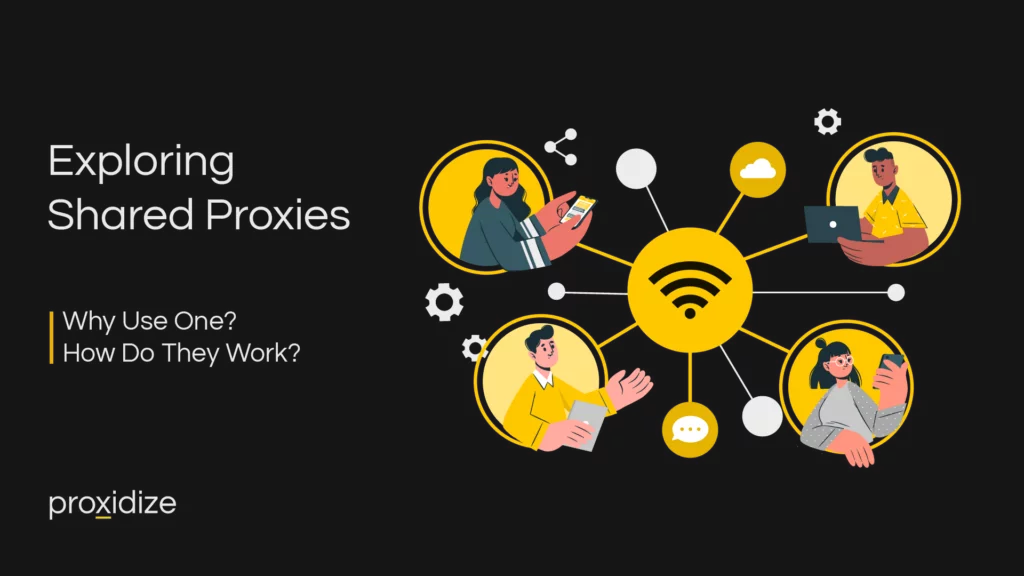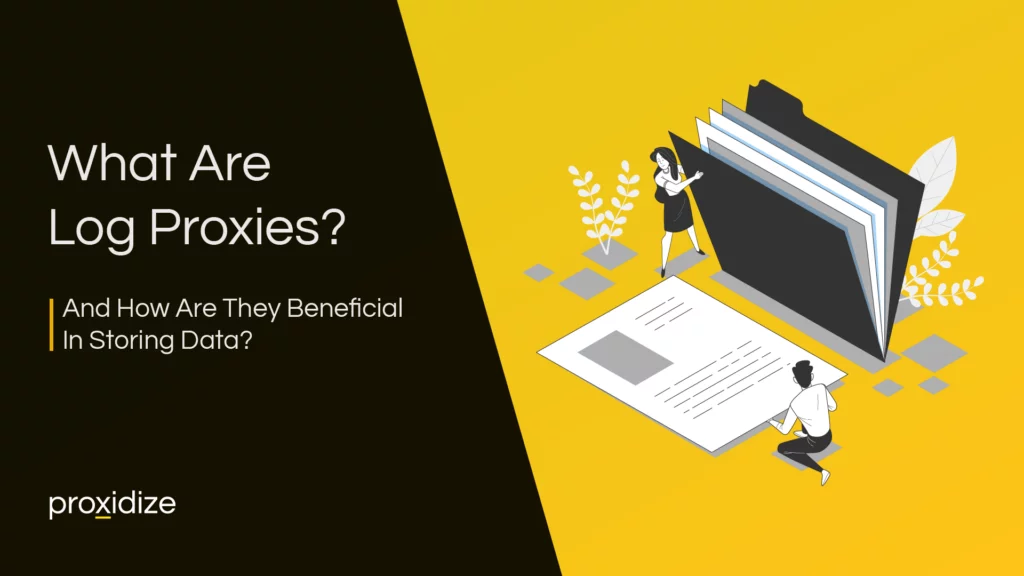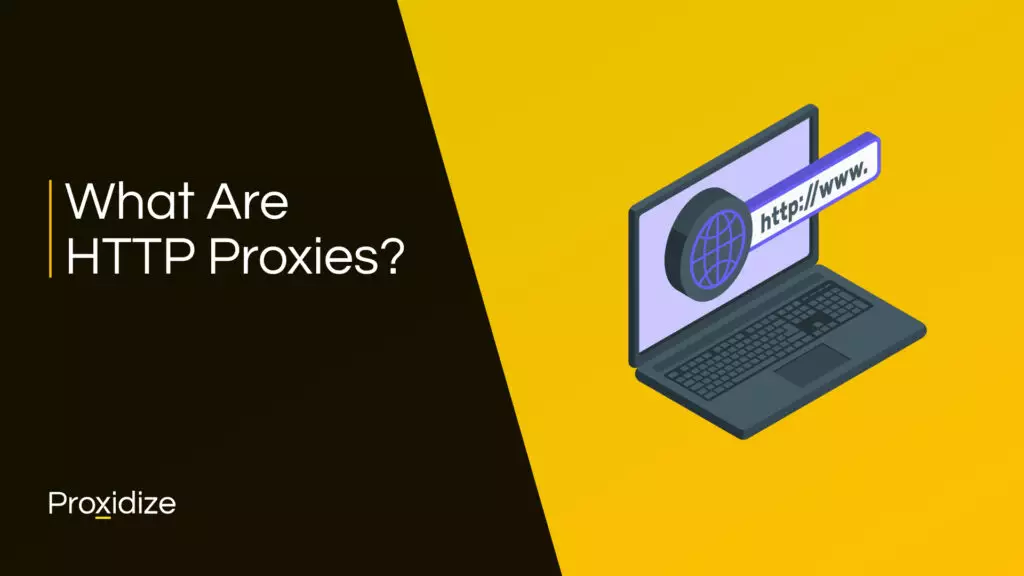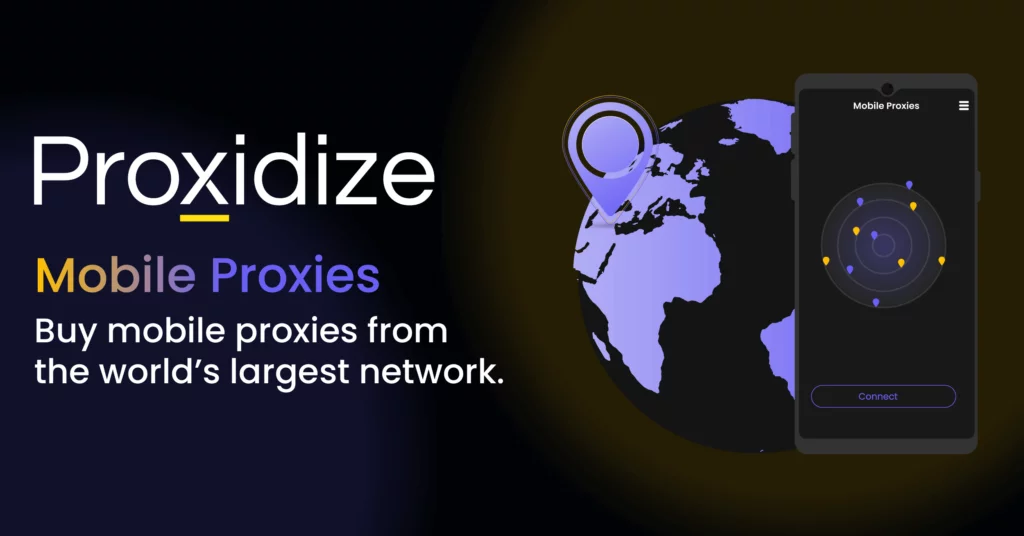What Is a Shared Proxy?
A shared proxy is any proxy that allows multiple people to share the same IP — or IP pool — at once. While many proxy types technically meet that description, what the term generally refers to is a proxy shared by more than one user for the purpose of online anonymity. What this means is that most websites talk about shared proxies in function of where they source their IP from, i.e. a datacenter, mobile, or residential source.
In this article we’ll discuss where shared proxies fit in the proxy ecosystem, why people use them and what for, what other types of proxy may fit the shared proxy definition, and what sets them apart as a distinct category.
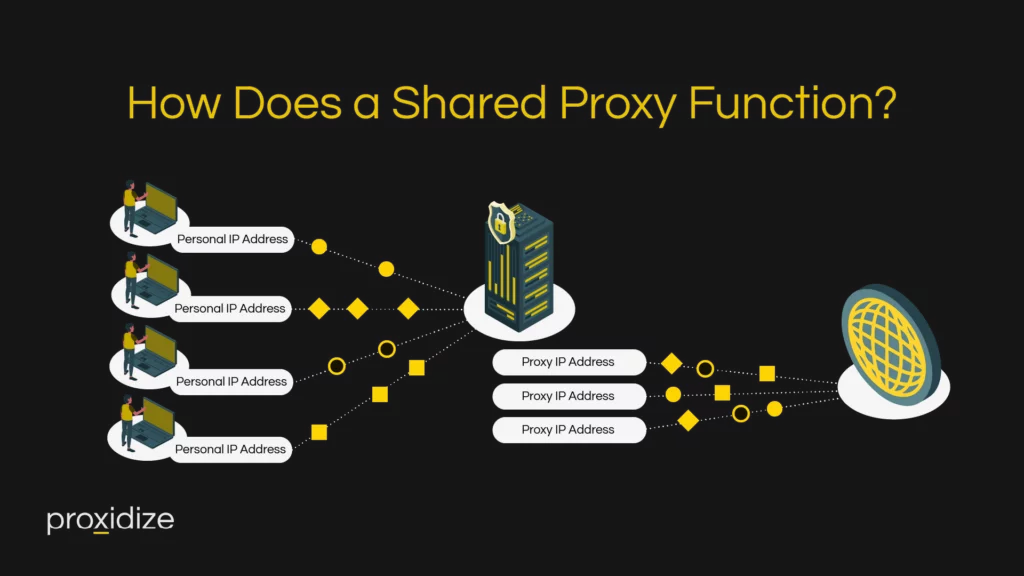
How Do Shared Proxies Work?
If a proxy server is an intermediary you connect to in order to borrow its IP and geolocation, then a shared proxy is a server that multiple people at once connect to. Any traffic from those connected is rerouted through the proxy, which queues and forwards the traffic on to the internet. The server then receives the responses and forwards those to the right user.
Via connection multiplexing, the server is able to juggle the simultaneous requests, keeping users’ concurrent sessions separate. This only became possible following the introduction of HTTP/2, which introduced multiplexing to HTTP. It allowed multiple requests and responses to be made over the same TCP connection. Each session is tagged with identifiers so the server can sort out whose traffic is whose.
Shared proxies aren’t limited to HTTP proxies. SOCKS5 proxies support multiplexing too, allowing multiple types of traffic (TCP, UDP, etc.) to pass through the same connection.
Doing it this way is more resource efficient. It cuts down on latency compared to simply processing each request and response in sequence, avoiding having to constantly open and close connections.
Most proxy providers’ pricing structure consists of charging users for access to their impressively large shared proxy network. These proxy pools will have IPs numbering in the thousands or tens of thousands. By placing reverse proxies between the user and the shared proxies, these proxy services are able to more efficiently allocate resources as needed, ensuring no one server gets overloaded. This lets the whole system be scaled up and down and for traffic to be redirected if a shared server fails.
Alongside offering access to a large pool of IP addresses, individual proxies can rotate their IPs automatically as a consequence of their IP source. Mobile proxies will rotate their IPs most frequently, residential proxies next most, and datacenter proxies may rotate their IPs or be static.
In theory, shared proxies could have their efficiency boosted even further by caching frequently accessed resources, but that would necessitate not just reading the traffic being processed but also storing data linked to user activity.
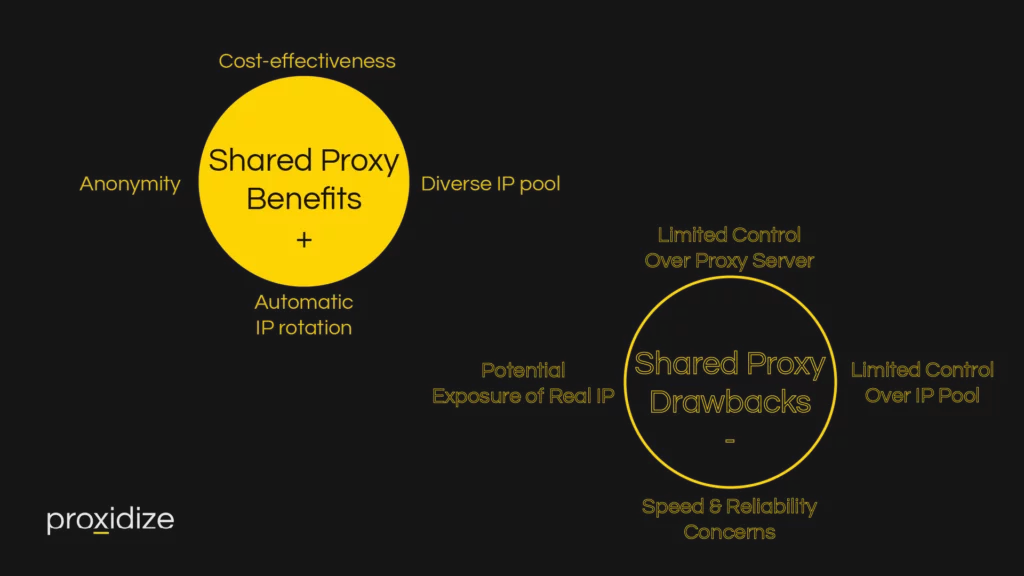
What Are the Pros and Cons of Shared Proxies?
Advantages of Shared Proxies
Cost Effective: Shared proxies allow multiple users to share the proxy infrastructure otherwise allocated to a single user. This inherently brings with it cost benefits which is why shared proxies are significantly cheaper, sometimes by a factor of 100.
Accessible: Shared proxies offer access to up to tens of thousands of IPs almost instantly.
Convenient: Most proxy providers operate on a pay-as-you-go or pay-by-the-GB model, only charging for data used rather than access to specific proxies.
The combination of a low initial investment and a large pool of proxies to access makes shared proxies an attractive option for those who prioritize above all else the price of a proxy on the one hand and diversity of IPs on the other.
Disadvantages of Shared Proxies
Bandwidth Overload: Everyone who connects to a shared proxy is sharing the same resources; the server has to be able to allocate enough bandwidth and processing power to everyone. This can result in slower speeds and less reliable proxies, particularly for popular servers or locations.
Bad Neighbors: By far the most common use case for proxies are web automation and web scraping. The internet is exceptionally unfriendly to bots at the best of times and not everyone successfully avoids the ire of websites’ anti-bot measures. This can result in IPs being flagged and placed on blacklists or blocked.
This problem can be compounded by explicitly bad actors and malicious users capitalizing on shared proxies’ accessible price. Their actions have resulted in IPs being flagged by anti-fraud measures and placed on more serious blacklists. The end result is that shared proxies can be low quality, i.e. more likely to be rate limited and blocked by websites or more likely to trigger anti-bot measures like CAPTCHAs.
In short, all the things that make shared proxies shine are also the source of their drawbacks. Their low barrier to entry and affordability can result in overburdened servers, slower speeds, and IPs with a higher likelihood of having been flagged in the past.
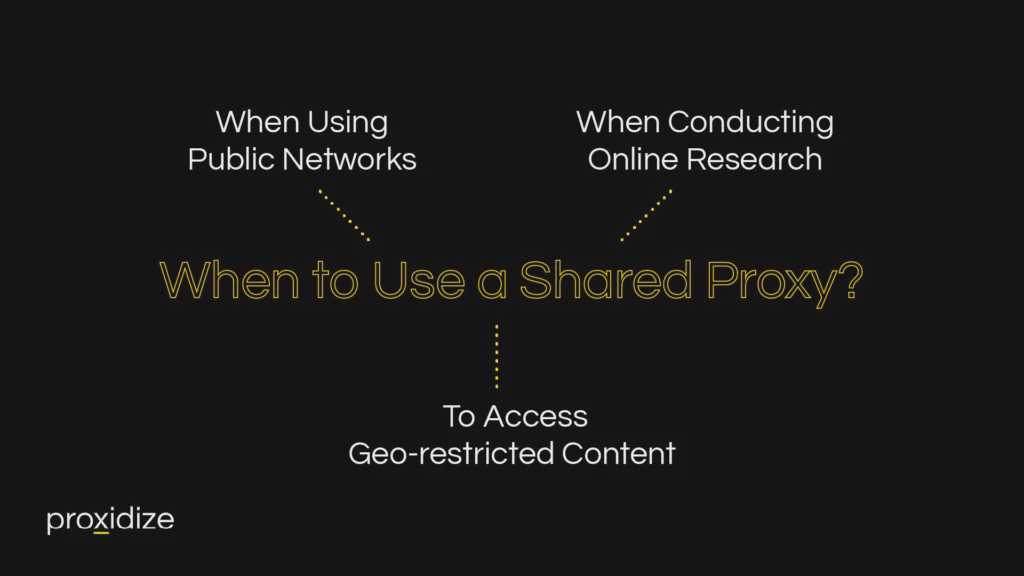
When Should You Use a Shared Proxy?
Shared proxies’ affordable price relative to more exclusive proxies makes them a great entry point for a range of web automation.
The lowest intensity web automation or web scraping can in theory take place from your own IP at first. You’ll eventually want to secure another IP as your project scales up; if not to protect your own IP then because you’ve already been blocked — ask me how I know.
Some websites don’t have aggressive or robust anti-bot features, so a shared proxy might be all you need to start scaling up your scraping. The same might also be true for some of the more obscure social media sites, allowing you to start automating on those platforms too.
If you’re a small business, you might not be able to directly compete with the multinational ecommerce platforms. However, routinely scraping your local competitors’ websites for market research and price monitoring could make a shared proxy useful to you without the higher price point of a dedicated proxy. They’re also useful when you need a proxy in a specific country (e.g. to access geo-restricted content) and can sacrifice quality for it.
Shared Proxy Alternatives
You’ve tried a shared proxy and you want more — faster speeds, higher quality proxies, more control, etc. What are your options? If a shared proxy is one extreme of the spectrum, where many people share a proxy, dedicated proxies or private proxies are on the other end of the spectrum. This is a proxy you have sole access to and greater control over. Let’s discuss alternatives to a shared proxy:
Private Proxies: Also known as dedicated proxies, private proxies are to which a user has exclusive access. They offer enhanced anonymity as there is no overlap of IPs with other users. This also reduces the risk of being rate limited or banned. By not having to share a proxy server’s resources with other users, a dedicated proxy offers faster speeds, more stable connections, and is generally better suited to more intense automation. They are significantly more expensive than their shared counterparts.
Semi-Dedicated Proxies: These proxies are a compromise between the performance of a private proxy and the affordability of a shared one. By limiting the number of users using the proxy to only a few you’re able to mitigate some of the most impactful drawbacks of shared servers while maintaining the advantages of dedicated ones as much as possible.
Conclusion
In short, shared proxies are a cost-effective entry point for using proxies in practice. They’re cheap, plentiful, and if you accidentally scrape far too much data from a website you won’t break the bank. They let you hide your real IP address, and proxy providers maintain a very large pool of shared IPs from across the world that are ideal for low-intensity automation.
On the other hand, shared proxies are unlikely to be fast. They’re also much more likely to have been flagged in the past making it likely that they have been blocked by many of the most popular websites. On top of that, their presence on blacklists might lower the barrier for less strict sites to impose rate limits or IP bans.
Are shared proxies suitable for SEO activities?
Shared proxies can be used for basic SEO monitoring and rank tracking, especially for low-budget campaigns. However, private proxies or dedicated datacenter proxies are often better suited for SEO tasks requiring high success rates and stability.
How do shared proxies handle connection requests from multiple users?
They use connection multiplexing to manage concurrent connections. This ensures stable connections by tagging requests with unique identifiers, allowing seamless traffic handling.
Can shared proxies handle rotating IPs?
Yes, shared proxies often include automatic IP rotation. The rotation frequency varies based on the type of proxy, with mobile proxies rotating most frequently and datacenter proxies rotating less often.
How does the IP pool size affect shared proxy performance?
Larger IP pools provide greater diversity, reducing the chance of IP bans. Providers with enterprise-grade proxy servers and robust proxy solutions generally maintain larger pools, ensuring better performance.
What risks are associated with shared proxies?
Shared proxies may have flagged IPs due to malicious activity by other users. This can result in reduced success rates, slower connection speeds, and potential security risks for legitimate users.


